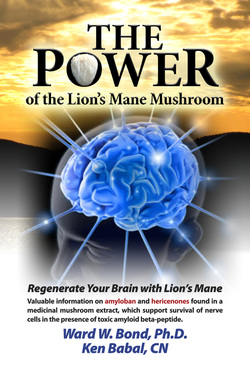 Lion’s Mane (Hericium erinaceum), or yamabushitake, is an extraordinary mushroom for maintaining brain health and improving cognitive functions. It’s not surprising that a mushroom would surpass plants in this respect. Mushrooms differ from plants in that they develop at night. Because they contain no chlorophyll, they cannot manufacture food energy from the sun. Instead of calories from solar energy, they are said to provide lunar energy, which is believed to nourish the brain with intuition and imagination. Lion’s Mane is one of the edible mushrooms widely distributed in Japan and China. Its name comes from its beautiful white icicle-like spines. One variety of the mushroom is marketed as a remedy for gastric and duodenal ulcers and chronic gastritis. In traditional Chinese medicine, Lion’s Mane is used to promote strength, vigor and good digestion and for prevention of gastrointestinal cancer. Its beta glucan composition is very similar to some of the most potent anti-cancer mushrooms such as Agaricus blazei. Also, a hot-water extract made from Lion’s Mane is considered a health tonic and sports beverage. In clinical trials with aged disabled patients, Lion’s Mane treatment healed methicillin-resistant Staphylococcus aureus ((MRSA) infections. (MRSA is a pathogen prevalent in hospital settings.) Scientific studies performed in Asia confirm traditional use of Lion’s Mane as a cardiovascular, respiratory and nervous system tonic. In particular, Japanese studies show that Lion’s Mane is able to regenerate neurons by stimulating production of Nerve Growth Factor. Comments are closed.
|
Archives
May 2022
|
 RSS Feed
RSS Feed